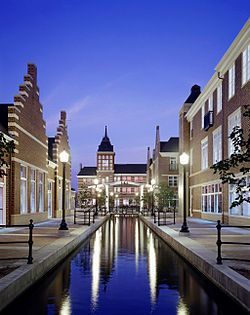Pella, Iowa
| Pella, Iowa | |
|---|---|
| City | |

Molengracht Canal in Pella's central business district
|
|
 Location of Pella, Iowa |
|
| Location in the United States | |
| Coordinates: 41°24′26″N 92°55′2″W / 41.40722°N 92.91722°WCoordinates: 41°24′26″N 92°55′2″W / 41.40722°N 92.91722°W | |
| Country |
|
| State |
|
| County | Marion |
| Area | |
| • Total | 8.73 sq mi (22.61 km2) |
| • Land | 8.73 sq mi (22.61 km2) |
| • Water | 0 sq mi (0 km2) |
| Elevation | 886 ft (270 m) |
| Population (2010) | |
| • Total | 10,352 |
| • Estimate (2012) | 10,397 |
| • Density | 1,185.8/sq mi (457.8/km2) |
| Time zone | Central (CST) (UTC-6) |
| • Summer (DST) | CDT (UTC-5) |
| ZIP code | 50219 |
| Area code(s) | 641 |
| FIPS code | 19-62040 |
| GNIS feature ID | 0460063 |
| Website | cityofpella.com |
Pella is a city in Marion County, Iowa, United States, with a population of 10,352 at the time of the 2010 census. Pella is the home of Central College, as well as several manufacturing companies, including Pella Corporation and Vermeer Manufacturing Company.
In 1847, 800 Dutch immigrants led by Dominee (Minister) Hendrik (Henry) P. Scholte settled the area known as Pella. The name "Pella" is a reference to Perea, where the Christians of Jerusalem had found refuge during the Roman-Jewish war of 70; the name was selected because the Dominee and the rest were also seeking religious freedom. It was the childhood home of Wyatt Earp, whose father Nicholas Porter Earp had settled on a farm near Pella. His brothers Warren and Morgan were born in Pella.
According to the United States Census Bureau, the city has a total area of 8.73 square miles (22.61 km2), all of it land.
As of the census of 2010, 10,352 people, 3,735 households, and 2,500 families resided in the city. The population density was 1,185.8 inhabitants per square mile (457.8/km2). The 4,086 housing units averaged 468.0 per square mile (180.7/km2). The racial makeup of the city was 95.0% White, 0.7% African American, 0.2% Native American, 2.3% Asian, 0.3% from other races, and 1.4% from two or more races. Hispanics of any race were 1.7% of the population.
...
Wikipedia

